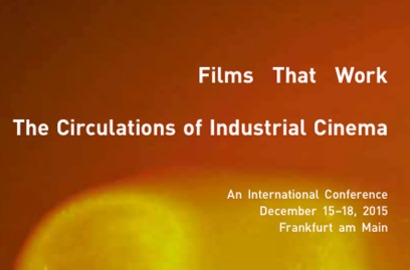Can machines be beautiful? Of course they can – celebrating the
beauty of industry and technology has been a key motif of the
avant-gardes of the 20th century, from Futurism to Russian
constructivism. But what happens when art itself becomes a useful part
of the machine, an engine of industry even? The international conference
“Films that Work” studied the use value of aesthetics and the uses of
film in industrial organizations and industrial policy in particular.
Conference Locations, Frankfurt am Main:
– Museum Angewandte Kunst, Schaumainkai 17
– Kino im Deutschen Filmmuseum, Schaumainkai 41
Date: 15.12.2015 - 18.12.2015
Featuring
the work of specialists from Europe, the United States and Asia, the
conference worked from the assumption that economic development requires
industrial organization, while industrial organization requires
communication and communication requires media. As economist Robert
Solow was among the first to point out (in a famous article from 1956, a
few years before Marshall McLuhan published “Understanding Media”),
without media such as the typewriter, the telephone, telex, telefax and
information technology the economic development of the last one hundred
and fifty years would have been unthinkable. Because of the emotional
impact of moving images, film continues to occupy a privileged position
in the “Medienverbund” of corporate communication.
Bringing
together perspectives from cinema and media studies, economic history
and science and technology studies, this conference aimed to develop an
analytical framework for understanding the uses of art in industry and
the media culture of industry.
The conference was open to the
public and included screenings of rare films from archives in the United
States, Great Britain, Italy and Central and Eastern Europe.
The whole program can be found in the attached PDF File.




